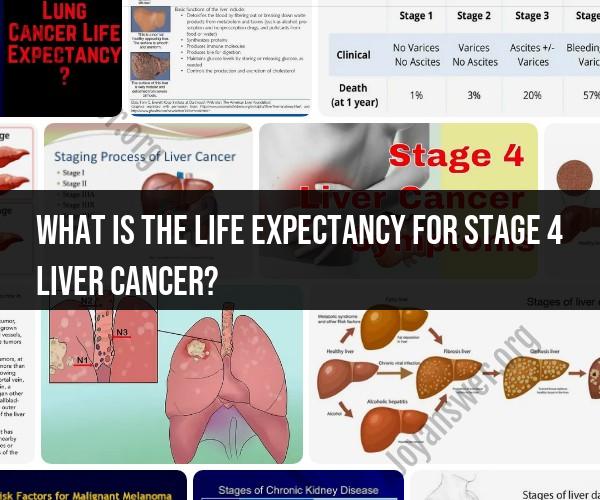What is the life expectancy for Stage 4 liver cancer?
The life expectancy for an individual diagnosed with Stage 4 liver cancer is generally quite limited, and it is often measured in months rather than years. However, it's important to understand that life expectancy can vary widely from one person to another based on several factors. These factors can significantly influence the prognosis and outlook for someone with Stage 4 liver cancer:
Type of Liver Cancer: Liver cancer is a broad term that encompasses different types of liver tumors. The most common type is hepatocellular carcinoma (HCC). The specific type of liver cancer can affect the prognosis and treatment options.
Extent of Spread (Metastasis): Stage 4 liver cancer indicates that the cancer has spread from the liver to other parts of the body. The number, size, and location of metastases, as well as the organs affected, play a significant role in determining life expectancy.
Overall Health: The individual's overall health and functional status are crucial factors. A person with Stage 4 liver cancer may have other health conditions that impact their ability to tolerate treatment and their overall prognosis.
Treatment Options: The availability and effectiveness of treatment options, including surgery, chemotherapy, targeted therapies, immunotherapies, and palliative care, can influence life expectancy.
Response to Treatment: Some individuals with Stage 4 liver cancer may respond well to treatment, leading to better outcomes and extended survival. Others may not respond as effectively.
Cirrhosis: The presence of cirrhosis, which is scarring of the liver tissue, can complicate the prognosis and treatment of liver cancer. Many cases of liver cancer are associated with underlying cirrhosis.
Child-Pugh Score: Medical professionals often use the Child-Pugh score to assess the severity of liver disease, including cirrhosis. The score helps predict a patient's prognosis and guides treatment decisions.
Tumor Biomarkers: Specific tumor biomarkers, such as alpha-fetoprotein (AFP) levels, can provide information about the aggressiveness of the cancer and its response to treatment.
Supportive Care: Palliative care and supportive interventions can improve the quality of life for individuals with advanced liver cancer, even if curative treatment is not possible.
It's crucial to consult with a healthcare provider, preferably an oncologist or hepatologist, for an accurate assessment of the individual's specific case. They can provide personalized information about prognosis, treatment options, and supportive care based on the unique circumstances.
In general, Stage 4 liver cancer is a serious and advanced condition with a limited life expectancy. However, advances in cancer treatment and supportive care have led to improvements in some cases. Ultimately, the outlook for each person will depend on their individual situation and how they respond to treatment and supportive care measures.
1. Life Expectancy with Stage 4 Liver Cancer: What to Anticipate
Stage 4 liver cancer is the most advanced stage of liver cancer, and it means that the cancer has spread to other parts of the body. The prognosis for stage 4 liver cancer is not good, but the life expectancy can vary depending on a number of factors, including the overall health of the patient, the type of liver cancer, and the location of the cancer.
The five-year survival rate for stage 4 liver cancer is about 3%. However, it is important to note that this is just a statistic, and it does not mean that everyone with stage 4 liver cancer will die within five years. Some people with stage 4 liver cancer may live for many years, even decades.
2. Liver Cancer in Stage 4: Prognosis and Life Expectancy Insights
There are a number of factors that can affect the prognosis for stage 4 liver cancer, including:
- The overall health of the patient: Patients with good overall health are more likely to have a better prognosis.
- The type of liver cancer: Some types of liver cancer, such as hepatocellular carcinoma, are more responsive to treatment than others.
- The location of the cancer: Cancer that has spread to vital organs, such as the brain or lungs, is more difficult to treat.
- The response to treatment: Patients who respond well to treatment are more likely to have a better prognosis.
3. Facing Stage 4 Liver Cancer: Exploring Life Expectancy and Treatment Options
Even though the prognosis for stage 4 liver cancer is not good, there are a number of treatment options available that can help to prolong life and improve quality of life. Treatment options for stage 4 liver cancer may include:
- Surgery: In some cases, surgery may be possible to remove the cancer or part of the liver.
- Chemotherapy: Chemotherapy uses drugs to kill cancer cells.
- Radiation therapy: Radiation therapy uses high-energy rays to kill cancer cells.
- Targeted therapy: Targeted therapy uses drugs that target specific molecules on cancer cells.
- Immunotherapy: Immunotherapy helps the body's own immune system to fight cancer.
If you have been diagnosed with stage 4 liver cancer, it is important to talk to your doctor about your treatment options. Your doctor can help you to develop a treatment plan that is right for you.
Conclusion
Stage 4 liver cancer is a serious disease, but there are a number of treatment options available that can help to prolong life and improve quality of life. If you have been diagnosed with stage 4 liver cancer, it is important to talk to your doctor about your treatment options.













